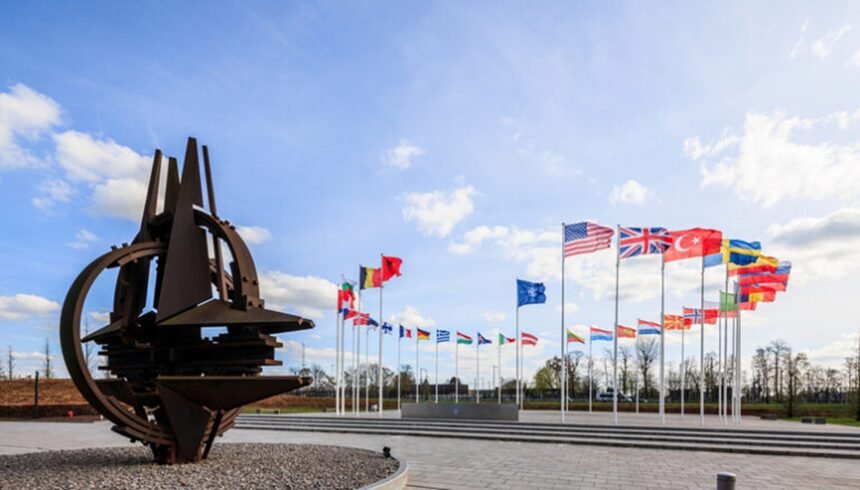NATO allies condemned Russia’s violation of Estonia’s airspace, while the Western military alliance convened a meeting of the North Atlantic Council to discuss the escalating crisis, marking the third recent provocation by Kremlin warplanes.
“I just spoke with Estonia’s Prime Minister, Kristen Michal, regarding today’s airspace violation by Russia,” said NATO chief Mark Rutte on social media Friday evening.
“The NATO response…was swift and decisive,” he added, referring to the scramble of alliance aircraft after the small Baltic state reported that three Russian MiG-31 fighter jets had entered its airspace.
Colonel Martin O’Donnell, spokesperson for Allied Air Command Europe, stated, “NATO reacted quickly under Operation ‘Eastern Guard,’ scrambling Italian F-025 fighter jets stationed in Estonia.”
“Sweden and Finland also deployed their aircraft promptly,” O’Donnell added.
The Russian Ministry of Defense later denied that its jets had violated Estonian airspace, claiming they were on a “planned flight…in accordance with international airspace regulations.”
No Flight Plans and Transponders Turned Off
The Estonian military reported that the Russian jets remained in the country’s airspace for 12 minutes near Vaindlo Island without requesting permission.
“The fighter jets had no flight plans, and their transponders were turned off,” the military said.
“At the time of the airspace violation, the aircraft did not communicate with Estonian air traffic control,” it added.
Michal stated that his government requested the activation of NATO’s Article 4, which mandates a meeting of alliance members but does not carry the weight of Article 5.
Article 4 stipulates that “the parties shall consult together whenever, in the opinion of any of them, the territorial integrity, political independence, or security of any of the parties is threatened.”
Estonia’s Ministry of Foreign Affairs also summoned the Russian chargé d’affaires to deliver a formal note of protest over the incident.
“I would say that NATO’s air defense was successful; the jets left, and the Russian aircraft were forced to retreat. But remaining in Estonia’s airspace for so long is, of course, at the very least hostile, if not a planned operation,” Michal said.
In response, NATO announced that the North Atlantic Council—the alliance’s principal political decision-making body—would meet early next week to discuss Russia’s actions.
U.S. President Donald Trump told reporters he would soon be briefed on the reported airspace violation.
“I don’t like it… I don’t like it when this happens. It could cause big problems, but I’ll inform you later,” he said.
The EU’s High Representative for Foreign Affairs, Kaja Kallas, called Russia’s action an “extremely dangerous provocation.”
The incident follows recent Russian drone violations over Poland and Romania, both NATO and EU members, while Russia had directed drones into Ukraine as part of its nearly four-year-long war against its neighbor.
Jim Townsend, senior fellow at the Center for a New American Security in Washington and former Assistant Secretary of Defense for European and NATO Policy, described the incident as “a serious breach,” considering Estonia’s small size and the flight duration.
“It’s a very serious matter,” he told Radio Free Europe.
Townsend noted that NATO may need to double the number of aircraft assigned to the Baltic Air Policing mission, as pilots can become fatigued during prolonged high-alert periods.
NATO established this mission in 2004 to patrol the skies over Lithuania, Latvia, and Estonia after the three countries joined the Western alliance.
Luke Coffey, senior fellow at the Hudson Institute in Washington, told Radio Free Europe, “I expect these [Russian airspace violations] to continue until a strong response occurs; until NATO creates conditions where any risk Russia undertakes with such violations is not worthwhile.”
“I believe this is part of Russian President Vladimir Putin’s broader strategy to challenge Trump while simultaneously highlighting divisions within the alliance,” Coffey added.
NATO announced on September 12 that it would strengthen defense through the so-called “Eastern Flank,” initiating ‘Eastern Guard’ activities that would deploy additional military assets from the UK, Denmark, France, and Germany to deter potential Russian aggression.
Zelensky Calls the Airspace Violation ‘Scandalous’
Ukrainian President Volodymyr Zelensky condemned Russia for escalating tensions after its aircraft violated Estonian airspace, describing the move as “scandalous” and “escalatory.”
“These are not accidents. This is a systematic Russian campaign against Europe, NATO, and the West. This requires a systematic response,” Zelensky wrote on social media.
European Commission President Ursula von der Leyen referred to previous drone violations while announcing new EU sanctions proposals.
“From time to time, President Putin escalates, and Europe responds by increasing pressure,” she said.







